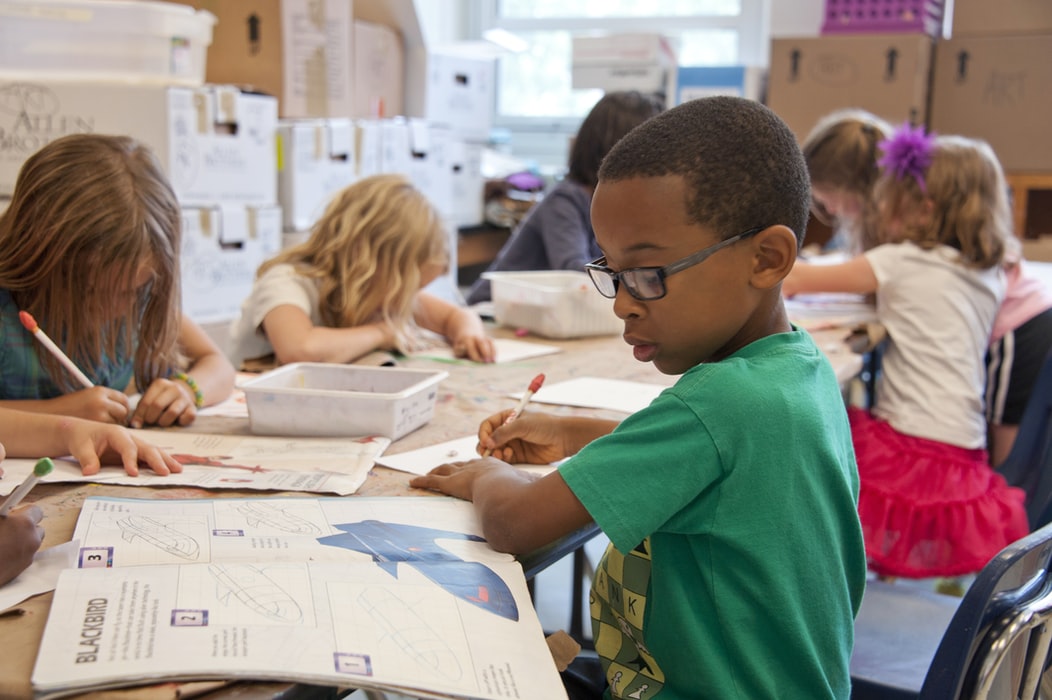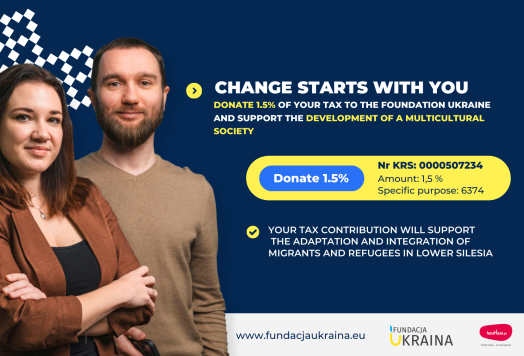Summer holidays are in full swing, however, each passing day makes us closer to September, and thus, to the beginning of the new school year. Foundation Ukraine along with Aleksandra Kosior – a teacher and intercultural assistant have prepared an article that will help to take the first steps in the Polish education system.
Polish education system – what should you know?
Education in Poland is compulsory for children aged 7 to 18 years. The Polish education system is divided into three stages:
Primary school – pupils start primary school at the age of 6 or 7 and it lasts up to 8 years. The 8th grade ends with an end-of-school exam. Its result is considered when applying to a secondary school that the student will attend.
Secondary school – learning at this school takes at least 4 years. There are several types of secondary schools that can be chosen by students according to their predispositions and interests: upper secondary school (4 years), technical secondary school (5 years), vocational school (1st degree – 3 years, 2nd degree – 2 years). After graduating from upper secondary school and technical secondary school students have the right to take the school-leaving examination.
Higher education institutions – pupils who have graduated from secondary school and have passed the school-leaving examination (Matura) may decide on studying at universities.
Private and public schools – which to choose?
There are many types of schools that you can choose. The educational offer is so rich that everybody can find a solution that will meet the child’s needs.
Public schools provide education for children on the basic level, giving them an opportunity to develop some of their talents in an extended way. Some schools have specialized classes (sports, language), as well as numerous extra classes (free or paid). Many of them offer a really high level of education.
Private schools provide students with a slightly higher level of education than public schools and can provide additional benefits (international exams, trips abroad). There are many types of non-public schools. Among them you can find:
- International schools
- IB schools (based on the International Baccalaureate program)
- Montessori schools
- Language schools
- Religious schools
- Special education institutions
However, you should remember that non-public schools charge fees for providing education.
How to enroll your child in public school?
Regionalization is applicable in primary school. This means that the place of residence decides about admission to a school. Starting from the 1st grade to the 8th of primary school, students are admitted to regional schools ex officio and based on documents. When enrolling in a district school, you should present a document confirming residence in this area (rental agreement, flat purchase agreement, statement of the person with whom the child’s family is staying).
If you want to enroll a child in another primary school that is not a child’s district school, pupils can be admitted to it based on documents and if there are vacant places. In some schools a principal invites a child and parents to a meeting. That usually fosters a positive admission decision. If you want to enroll a child in a bilingual, sports or international school or class, apart from documents and conversation with the school board, the child will have to take language or P.E. tests.
Young people are admitted to secondary schools based on their academic achievements and documents confirming them. Apart from the exam results and grades on the certificate, subject competitions, participation in sports tournaments, social and voluntary activities are also considered. All activities should be documented (diplomas, certificates).
How to prepare a child to study at a Polish school?
Changing schools is always difficult for a child, especially if it is a complete change of the cultural and linguistic environment. What can be done to help your child in the first weeks of learning in the new school?
- Take care of the language. At least a basic knowledge of the Polish language will help the child cope with the new situation. It is worth thinking about summer language courses, online materials, or tutoring.
- Knowledge is the basis. Find out as much as possible about the education system of the new country. Thanks to this, you will prepare your child for what he will encounter in the new school. Are you reading this article? This is a great first step!
- Contact the school. Make an appointment with the school board and discuss the school rules. The school board may suggest an earlier meeting with the class teacher or a teacher supporting foreign students. This will considerably facilitate the start of your child.
- Consider the opinion of specialists. Your child should go to the 6th grade, and the school board proposes the 5th grade? It is worth considering such a solution. Remember that the schools employ experienced educators who have helped foreign pupils many times. They know what is good for your child. Also, use the help of psychological and pedagogical counseling centers if advised by teachers. Thanks to this, they will be able to help the pupils who need additional support.
- Get involved. From the very first days, try to participate in school life and encourage your child to do so (but do not force him!).
Can foreign students count on additional help?
Support for foreign pupils is organized on the national and local level, which varies depending on the place of residence.
Additional lessons. Every foreigner has the right to additional Polish lessons as a foreign language (2 hours a week), as well as to compensatory classes in subjects with which they have difficulties because the curriculum from the previous school differs significantly from that of the school the child attends ( 1 hour a week).
Wroclaw, as a city of meetings, is constantly trying to expand its offer of help for foreign pupils. The city’s activities are very wide, from ad hoc help for pupils to specialized training for teachers who will work with foreigners. Major initiatives that you can take advantage of in Wroclaw’s schools are:
Preparatory classes. In Wroclaw, you can find preparatory classes in 6 primary schools and one secondary school. Foreign-language children who start their education at a Polish school attend preparatory classes. In such a class, children have more Polish lessons, learn everyday communication, and words and expressions in Mathematics, Nature, History, and other subjects. They learn about Polish culture, take part in thematic lessons and integration activities, thanks to which they explore the city and the surrounding area. The preparatory class lasts from 3 to 10 months, after which the child can move to a traditional class in the district school or another school chosen by the parent. For more information, please visit: https://www.wielokultury.wroclaw.pl/klasy-przygotowawcze-dla-dzieci-obcojezycznych/
Starter pack. It is a publication prepared for foreign language pupils and their parents. There you will find all the necessary information that will be useful during the beginnings in Polish school – from document templates, through information about the everyday life at Polish schools, to a glossary of the most important concepts that you will meet at school. The document is in three languages: Polish, Ukrainian, and English. You can download it for free at: https://www.wielokultury.wroclaw.pl/o_nas_dokumenty/
Intercultural assistants. Some schools employ intercultural assistants. They are people who support foreign pupils and their parents. The assistant usually stays at a given school for several hours a week. During this time, he can help parents to solve administrative problems (filling in the documents), and supports the pupil’s learning (help with homework, participation in lessons). The assistant also helps teachers in solving conflicts among pupils that arise from cultural differences and language barriers. Wroclaw assistants know foreign languages, incl. English, Ukrainian, and Russian, which often helps to establish a relationship with pupils at the very beginning.
Stay in touch with the Foundation Ukraine!
In addition, the Foundation conducts training for parents on various topics that can be useful in adaptation of children, who have experienced a migration and their parents. Stay in touch with the Foundation Ukraine and check the offer of events on our social media!
Facebook: https://www.facebook.com/CUKR.Wroclaw/ and https://www.facebook.com/fundacja.ukraina/.
Instagram: https://www.instagram.com/cukr.wroclaw/
YouTube: https://www.youtube.com/channel/UCS9Afcq5gYybQwMTOvfeGXg.

Bezpieczna przystań
Wyłączna odpowiedzialność za wyrażone opinie spoczywa na autorze i Komisja Europejska oraz Ministerstwo Spraw Wewnętrznych i Administracji nie ponoszą odpowiedzialności za sposób wykorzystania udostępnionych informacji





